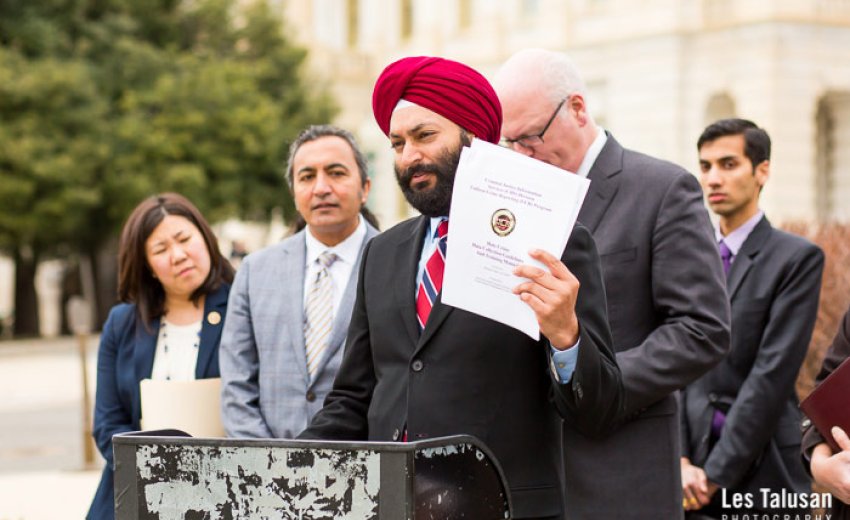FBI Takes Step to Address Needs of Sikh Americans and Other Communities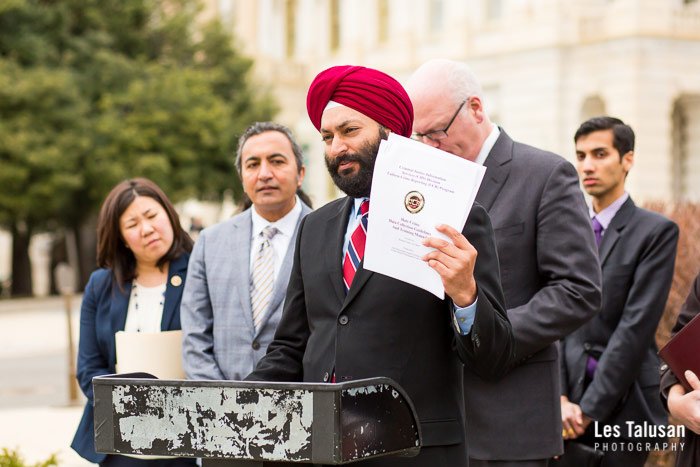
Addressing the attendees SALDEF's executive director Jasjit Singh said:
"Thank you (names those in attendance) for your remarks and years of support of the Sikh American community and this issue.
Today I’m reminded of the words of Harpreet Saini, who lost his mother in the attack on the Sikh Gurdwara in Oak Creek Wisconsin, the deadliest attack on a house of worship in America in almost 50 years. He testified in front of Congress and asked them to “give my mother the dignity of being a statistic.”
I remember the words of Police Chief Edwards who wondered why he had no federal form on which to record the attack as an anti-Sikh hate crime.
Today marks progress, no doubt, but that progress will only be realized when our communities -- Sikh, Hindu, Arab Americans, and others, report these incidents, AND when law enforcement partners with and learns about our communities. That is what will make this progress real.
Today I can say the victims of hate will no longer go unacknowledged. Today I can say the specter of hate will no longer go unchallenged. Today we all stand together to show that hate has no place in America. An attack on one of us is an attack on all of us, and only together will we address the root of this hate."
WASHINGTON, D.C., March 25, 2015 —The Sikh American Legal Defense and Education Fund (SALDEF) commented today on the release of the updated FBI Hate Crime Data Collection Guidelines and Training Manual, considered the single most important and inclusive hate crime training resource available for law enforcement officials. This version now includes a special considerations section to help local police officials effectively identify and report the new categories of crime mandated for collection in 2015 – including hate crimes directed at Sikhs, Arabs, and Hindus. SALDEF, alongside Sikh advocates and other civil rights groups, worked closely to counsel FBI officials on the Sikh community’s needs throughout this process. We encourage the FBI to continue to improve the manual and law enforcement training to ensure appropriate classification of crimes where a Sikh is targeted for his or her articles of faith.
In 2010, Jasjit Singh, SALDEF’s executive director first presented to the FBI’s Advisory Policy Board in Boston, making a case for the need for a Sikh category. In February 2012, he subsequently met with then FBI Director Robert S. Mueller III on behalf of the Sikh community, alongside leaders of other civil rights groups including the Interfaith Alliance, Muslim Public Affairs Council and the American-Arab Anti-Discrimination Committee.
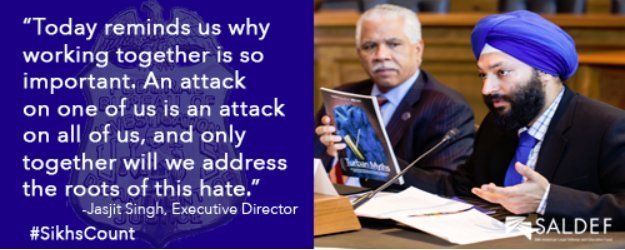
Jasjit Singh commented, “The release of the updated Hate Crimes Tracking form and manual, a reform Sikh Americans and SALDEF have advocated towards for half a decade, marks a step towards ensuring accurate reporting of hate crimes committed against Sikhs, an important step that will ultimately aid the Sikh community as we continue to address the roots of anti-Sikh bias. Sikh, Muslim, Hindu, South Asian, and Arab Americans have disproportionately faced senseless violence motivated by hate in recent years. We look forward to continuing our work with the FBI to ensure law enforcement is addressing the Sikh community’s needs. Today reminds us why working together as partners is so important. An attack on one of us is an attack on all of us, and only together will we address the root of this hate.”
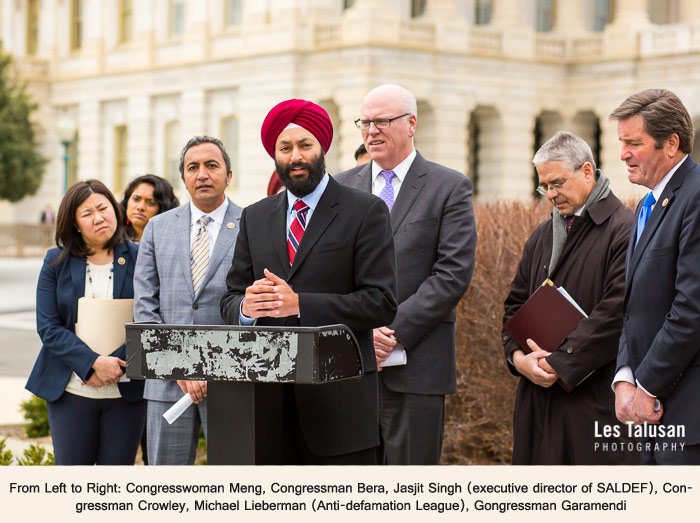
“Time and time again, we have seen vicious attacks on members of the Sikh community. Collecting data on hate crimes is more than just putting a number in a column – it means giving law enforcement agencies the resources and information they need to help prevent this kind of violence in the first place,” said Rep. Crowley. “I’ve been proud to work alongside my colleagues in Congress and hand-in-hand with advocates like SALDEF to shed light on this critical issue. The fact is, this victory is only possible because of the tenacious and tireless efforts of advocates and of citizens across the country who stood up and said, ‘enough is enough’.”
Following the August 2012 attacks on the Gurdwara in Oak Creek, Wisconsin, over 140 Members of Congress joined the years of calls by members of the Sikh American community with their partners Rep. Joe Crowley, Rep. Judy Chu, Rep. David Valadao, Sen. Dick Durbin, and Sen. Dianne Feinstein urging the FBI to track hate crimes against the Sikh American community. In 2013, the Department of Justice and the FBI announced they would begin to track hate crimes against Sikh Americans and other communities, beginning this year with the release of the new hate crimes tracking form.
The FBI’s manual also includes updated definitions and training scenarios to help officers better serve their diverse communities. SALDEF, using the findings of Turban Myths, the first-ever study on the public perception of Sikh Americans, shared the impacts of unconscious and implicit bias towards Sikhs in order to inform these future FBI trainings. Turban Myths resulted from a collaboration between SALDEF and Stanford University researchers and continues to be covered by major media for its ability to pinpoint the roots of anti-Sikh bias in the United States. In 2015 and beyond, trainings will be conducted nationwide by certified Sikh American trainers as part our Law Enforcement Partnership Program.
Follow SALDEF on Facebook (www.facebook.com/saldef), Twitter (@SALDEF), and Instagram (SikhAmericans) and the hashtag #SikhsCount for further commentary and news related to this announcement.
###
-------------------------------
Related Article:
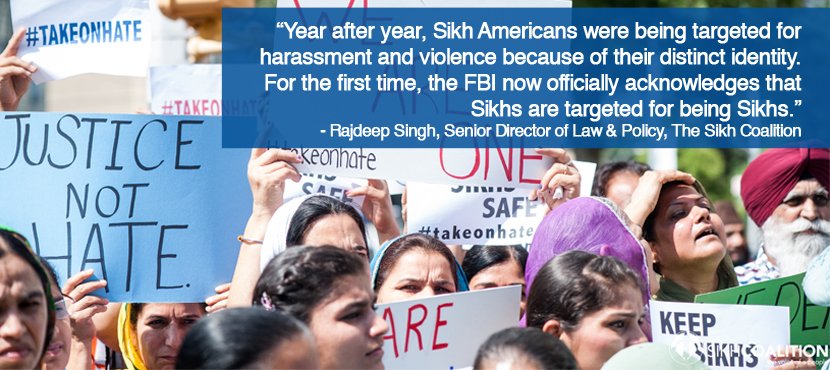
Sikhs Finally Represented in FBI Hate Crime Tracking Program
March 25, 2015 (Washington, DC) – After nearly four years of community advocacy, the Sikh Coalition is pleased to announce that the U.S. government now officially has a system in place to track hate crimes motivated by Anti-Sikh bias.
The Sikh Coalition first raised this issue in a letter to the U.S. Attorney General in 2011. Our demand was endorsed by over 130 U.S. Senators and Members of Congress and echoed at a U.S. Senate hearing by Harpreet Singh Saini in the wake of the Oak Creek tragedy. In 2013, the U.S. Attorney General announced that the FBI would begin tracking hate crimes against Sikhs and other minority communities.
After nearly two years, the FBI has released a new version of a training manual for law enforcement that includes guidelines for tracking Anti-Sikh hate crimes. Although the manual still needs further improvement, it mentions Sikhs for the first time and has the potential to educate thousands of law enforcement officials about Sikhs.
Sikh Coalition Next Steps – Focus on Training and Prevention
Now that the FBI officially recognizes Anti-Sikh hate crimes, the Sikh Coalition will continue to prioritize improvements to law enforcement training. In the past, when crimes were committed against Sikhs because of their identity, local law enforcement officials sometimes failed to investigate or charge these incidents as hate crimes due to ignorance about Sikh religious practices.
The federal government’s recognition of Anti-Sikh hate crimes means that police departments nationwide will have an opportunity to learn about the Sikh community. With the benefit of Sikh awareness training, we are hopeful that law enforcement officials will do a better job investigating and prosecuting bias incidents against Sikhs when they occur. The Sikh Coalition will continue to work with the FBI to improve these training materials moving forward.
We are also hopeful that this catalyzes more time and money to hate crime prevention, with an emphasis on bias prevention programs in our nation’s schools, local communities, and armed services now that data on Sikhs is being collected. It is critical to track hate crimes, but our top organizational priority is always working to improve prevention methods.
